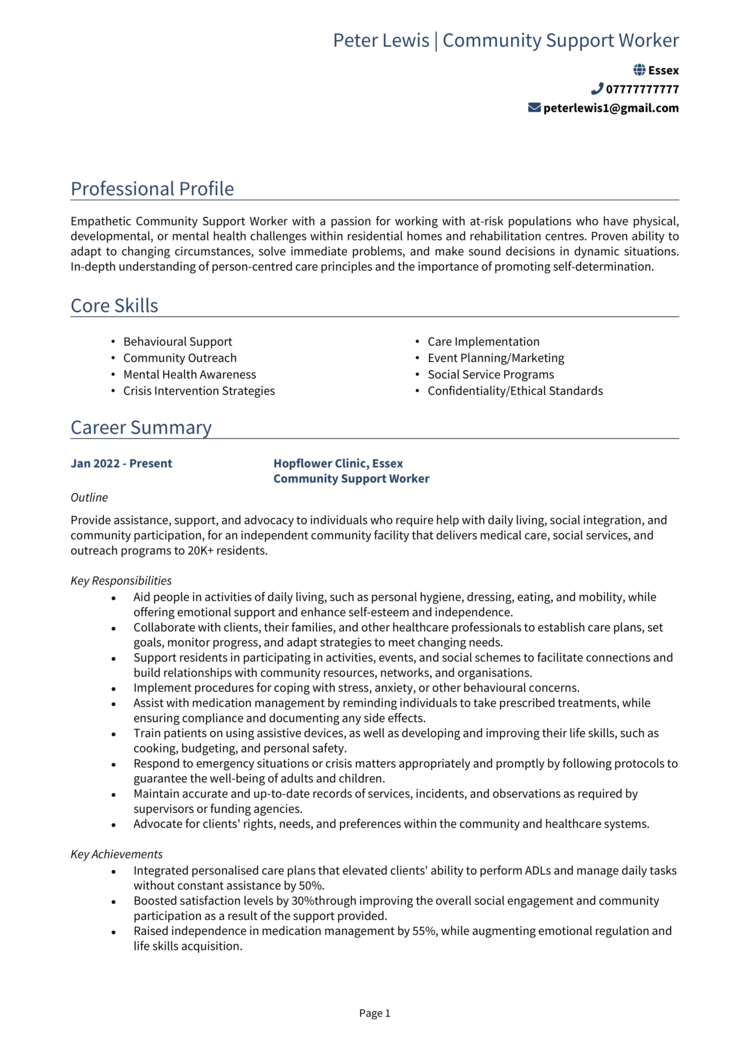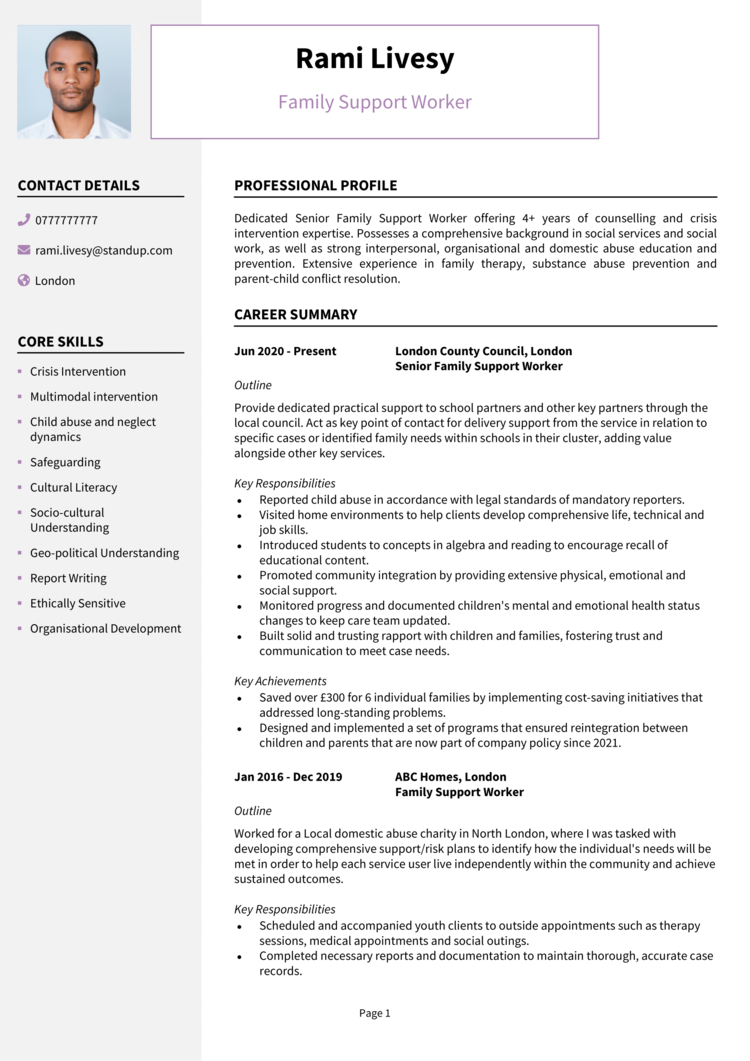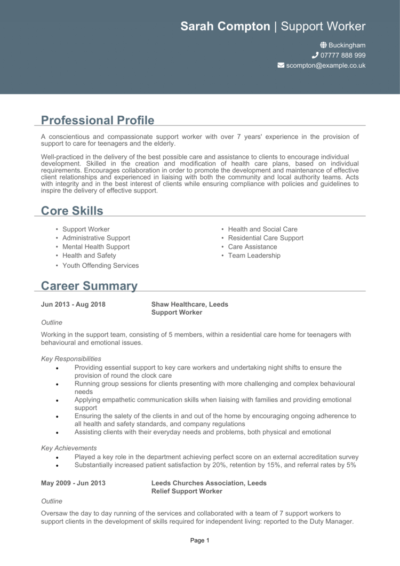Do you have the compassion to brighten someone’s day and the patience to navigate the world of care plans and paperwork without losing your cool?
As a Support Worker, you’re a lifeline for people who need assistance with their day-to-day lives. But before you can offer your skills and empathy to those who need it most, you’ll need a CV that shows recruiters you’re up to the task.
This guide, complete with Support Worker CV examples, will help you craft an application that highlights your care, commitment, and ability to provide practical and emotional support.
Support Worker CV

Community Support Worker CV

Family Support Worker CV

Disability Support Worker CV

Mental Health Support Worker CV

How to write your Support Worker CV
Learn how to create your own interview-winning Support Worker CV with this simple step-by-step guide.
A Support Worker CV is a chance to show recruiters your compassion, patience, and the skills you bring to the role. Employers want someone who can offer practical assistance while fostering independence and dignity.
This guide will walk you through writing a CV that accomplishes just that, reflecting your experience and readiness to provide invaluable support to those who need it.
Support Worker CV structure


A well-structured CV is like the care plans you’ll create as a Support Worker – clear, tailored, and focused on the essentials. Recruiters should be able to quickly see your skills and experience.
Here’s how to structure your Support Worker CV:
- Name and contact details – Personal details sit at the top to provide easy access for prospective employers. Including a photo is your choice: they’re not required.
- Profile – Hook the recruiter right away by stating the value you’ll bring their company: convey your passion for helping others.
- Core skills – State your best qualities at a quick glance, like care planning and risk assessment.
- Work experience – List your previous job titles from newest to oldest, focusing on your contributions to care.
- Education – Show off your academic record and qualifications that make you a good fit.
- Additional info – Include anything from your hobbies and interests to the languages you speak – these are all totally optional
What’s the correct format for a Support Worker CV?


Your CV’s format should reflect the care and attention you bring to your work. A poorly formatted CV is like forgetting to label a medication bottle – hard to navigate and a bit risky for your career prospects. Preventable formatting mistakes cost even the best candidates the job.
Here’s how to format your Support Worker CV:
- Bullet points – These let the recruiter pick out the key bits, like your responsibilities and achievements, with ease.
- Divide sections – Making the information easy to navigate with clearly-defined sections is important
- Use a clean font – Along with an appropriate colour scheme, ensure your font is easy for the recruiter to read.
- Keep it the right length – Aim for 2 pages: too long would start to bore the recruiter, and this is plenty of space to list the important details.
CV profile for a Support Worker


Your CV profile is your chance to show recruiters what makes you the ideal candidate for a Support Worker role. It should summarise your experience and commitment to helping others live with dignity and independence.
Support Worker CV profile examples
Profile 1
Compassionate Support Worker with five years of experience providing personalised care to individuals with physical disabilities. Skilled in creating care plans, offering emotional support, and assisting with daily activities to improve quality of life. Experienced in using care management software for documentation.
Profile 2
Dedicated Support Worker with three years of experience in mental health services, specialising in supporting individuals with anxiety and depression. Proficient in crisis intervention, promoting independence, and collaborating with multidisciplinary teams to deliver holistic care.
Profile 3
Experienced Support Worker with over seven years of expertise in elderly care, focusing on building strong relationships and ensuring dignity and respect. Skilled in assisting with personal care, administering medication, and facilitating social activities to reduce isolation.
What to include in your Support Worker CV profile
Here are some tips to ensure your profile is as effective as a well-timed cup of tea for someone having a tough day:
- Where you’ve worked – Mention care settings, charities, or organisations you’ve contributed to.
- Your top qualifications – Highlight relevant certifications or training in care work or health and social care.
- Key skills – Include abilities like empathy, communication, and care planning.
- People you’ve supported – Reference individuals or groups you’ve assisted, such as people with disabilities, elderly clients, or those with mental health needs.
- Care plans you’ve implemented – Mention any significant contributions you’ve made to creating or managing support plans.
Core skills section


Your core skills section provides a quick snapshot of your abilities, showing recruiters what you bring to the table with just a short set of bullet points.
For Support Workers, this should include interpersonal skills, care-specific abilities, and experience in maintaining the dignity and independence of the people you support.
Struggling to write a compelling support worker CV?
Try our CV builder – it’s designed to help you create a job-winning application with structured templates, pre-written content, and expert guidance.
Essential skills for your Support Worker CV
- Care Planning – Developing and implementing tailored plans to meet individual needs.
- Risk Assessment – Identifying and mitigating potential hazards to ensure client safety.
- Personal Care Assistance – Helping with daily tasks like hygiene, dressing, and eating.
- Medication Administration – Ensuring clients take their prescribed medications accurately.
- Communication Skills – Building trust and rapport with clients and their families.
- Advocacy – Representing client needs and preferences to ensure their voices are heard.
- Crisis Intervention – Responding calmly and effectively to emergencies.
- Mobility Support – Assisting with movement and transportation for clients with physical challenges.
- Training and Education – Supporting clients to learn new skills and achieve greater independence.
- Cultural Awareness – Providing care that respects diverse backgrounds and traditions.
Outlining your work experience


Your work experience section is where you show that you’ve walked the walk – not just supported people, but truly made a difference. Highlight the settings you’ve worked in, the people you’ve helped, and the impact you’ve had.
List your roles in reverse chronological order, focusing on your contributions and achievements.
How to structure jobs

- Outline – Provide an overview of the organisation, your role, and the type of care you provided.
- Responsibilities – Highlight tasks like care planning, personal assistance, or crisis intervention. Use action verbs like “supported,” “assisted,” or “implemented.”
- Achievements – Showcase measurable results, such as improved client independence, family feedback, or successful care interventions. Include figures wherever possible to add impact.
Work experience samples for Support Worker
Support Worker | BrightCare Services
Outline
Provided tailored support to individuals with physical disabilities, focusing on enhancing their independence and well-being. Delivered high-quality care in line with personalised care plans.
Responsibilities
- Assisted clients with daily living tasks, including meal preparation, mobility, and personal hygiene.
- Created and implemented individualised care plans in collaboration with healthcare professionals.
- Monitored clients’ progress and updated care documentation accurately.
- Provided emotional support and companionship to reduce feelings of isolation.
- Ensured a safe and supportive environment by adhering to health and safety standards.
Achievements
- Improved client independence by 20 percent through targeted mobility exercises.
- Achieved a 95 percent satisfaction rate in client feedback surveys.
- Recognised by management for maintaining accurate and detailed care records.
Support Worker | Mindful Horizons
Outline
Supported individuals with mental health challenges, focusing on promoting emotional well-being and encouraging independence. Worked closely with clients to achieve personal goals and improve daily living.
Responsibilities
- Assisted clients in accessing community resources and services.
- Conducted regular one-to-one sessions to provide emotional support and guidance.
- Implemented coping strategies tailored to individual needs.
- Worked collaboratively with therapists and social workers to ensure cohesive care.
- Maintained confidentiality and compliance with safeguarding protocols.
Achievements
- Reduced client relapse rates by 15 percent through consistent follow-up and support.
- Organised weekly group sessions that improved client social engagement by 25 percent.
- Praised by colleagues for demonstrating empathy and professionalism in crisis situations.
Support Worker | Golden Years Home
Outline
Provided high-quality support to elderly residents, ensuring dignity and respect in all aspects of care. Assisted residents with daily activities to maintain their quality of life.
Responsibilities
- Helped residents with personal care tasks, including bathing, dressing, and grooming.
- Administered medication according to care plans and documented usage.
- Facilitated recreational activities to enhance social interaction and mental stimulation.
- Supported residents during mealtimes, ensuring nutritional needs were met.
- Communicated with families about residents’ progress and well-being.
Achievements
- Increased resident participation in activities by 30 percent through engaging programmes.
- Improved medication accuracy by 20 percent with detailed record-keeping.
- Recognised for fostering strong relationships with residents and their families.
Education section


The education section is a short but impactful section, noting the things that developed the perfect support worker you are today. Include degrees, certifications, and relevant professional development courses.
List your qualifications in reverse chronological order, starting with the most recent.
Best qualifications for Support Workers
- Level 2 Certificate in Health and Social Care – Training in the basics of providing care and support.
- Care Certificate – A standard qualification for health and social care professionals.
- Level 3 Diploma in Adult Care – Advanced training in supporting adults with complex needs.
- Mental Health First Aid Certification – Training in identifying and responding to mental health crises.
- NVQ Level 3 in Supporting Individuals with Learning Disabilities – Specialised training for assisting clients with learning disabilities.





